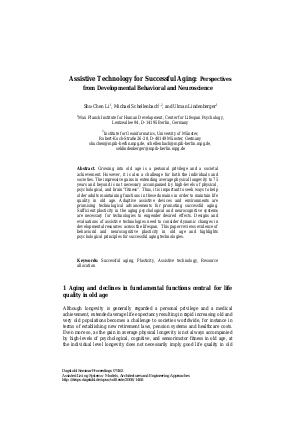Assistive Technology for Successful Aging: Perspectives from Developmental Behavioral and Neuroscience
Authors Shu-Chen Li, Michael Schellenbach, Ulman Lindenberger
-
Part of:
Volume:
Dagstuhl Seminar Proceedings, Volume 7462
Part of: Series: Dagstuhl Seminar Proceedings (DagSemProc) - License:
 Creative Commons Attribution 4.0 International license
Creative Commons Attribution 4.0 International license
- Publication Date: 2008-04-28
File

PDF
DagSemProc.07462.9.pdf
- Filesize: 295 kB
- 13 pages
Document Identifiers
Subject Classification
Keywords
- Successful aging
- Plasticity
- Assistive technology
- Resource allocation
Metrics
- Access Statistics
-
Total Accesses (updated on a weekly basis)
0Document
0Metadata
Abstract
Growing into old age is a personal privilege and a societal achievement. However, it is also a challenge for both the individuals and societies. The impressive gains in extending average physical longevity to 75 years and beyond is not necessary accompanied by high-levels of physical, psychological, and brain "fitness". Thus, it is important to seek ways to help older adults maintaining functions in these domains in order to maintain life quality in old age. Adaptive assistive devices and environments are promising technological advancements for promoting successful aging. Sufficient plasticity in the aging psychological and neurocognitive systems are necessary for technologies to engender desired effects. Designs and evaluations of assistive technologies need to consider dynamic changes in developmental resources across the lifespan. This paper reviews evidence of behavioral and neurocognitive plasticity in old age and highlights psychological principles for successful aging technologies.
Cite As Get BibTex
Shu-Chen Li, Michael Schellenbach, and Ulman Lindenberger. Assistive Technology for Successful Aging: Perspectives from Developmental Behavioral and Neuroscience. In Assisted Living Systems - Models, Architectures and Engineering Approaches. Dagstuhl Seminar Proceedings, Volume 7462, pp. 1-13, Schloss Dagstuhl – Leibniz-Zentrum für Informatik (2008)
https://doi.org/10.4230/DagSemProc.07462.9
BibTex
@InProceedings{li_et_al:DagSemProc.07462.9,
author = {Li, Shu-Chen and Schellenbach, Michael and Lindenberger, Ulman},
title = {{Assistive Technology for Successful Aging: Perspectives from Developmental Behavioral and Neuroscience}},
booktitle = {Assisted Living Systems - Models, Architectures and Engineering Approaches},
pages = {1--13},
series = {Dagstuhl Seminar Proceedings (DagSemProc)},
ISSN = {1862-4405},
year = {2008},
volume = {7462},
editor = {Arthur I. Karshmer and J\"{u}rgen Nehmer and Hartmut Raffler and Gerhard Tr\"{o}ster},
publisher = {Schloss Dagstuhl -- Leibniz-Zentrum f{\"u}r Informatik},
address = {Dagstuhl, Germany},
URL = {https://drops.dagstuhl.de/entities/document/10.4230/DagSemProc.07462.9},
URN = {urn:nbn:de:0030-drops-14680},
doi = {10.4230/DagSemProc.07462.9},
annote = {Keywords: Successful aging, Plasticity, Assistive technology, Resource allocation}
}
